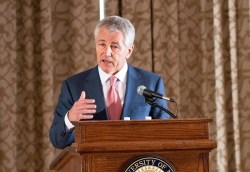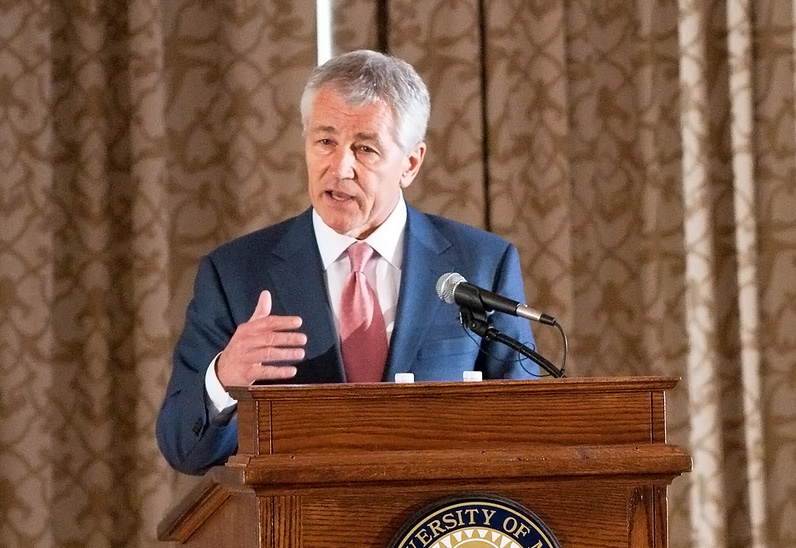
Gerald R. Ford School of Public PolicyChuck Hagel: Will his inner climate hawk defeat his inner climate skeptic?
Chuck Hagel, President Obama’s nominee for secretary of defense, has long been confused about climate change … and yet concerned about it too. He has a history of obstructing climate action, but also a record of elevating climate as a national security issue. If he’s confirmed to head the Department of Defense, he might ultimately show himself to be a climate hawk — though not one who hews to green orthodoxy or any party line.
Confused Chuck
On the one hand, Hagel — a Republican senator from Nebraska from 1997 to 2008 and now co-chair of the President’s Intelligence Advisory Board — has professed many views you might associate with a climate denier.
In fact, his name is tied to the Senate’s first high-profile repudiation of climate action: In 1997, he cosponsored the Byrd-Hagel resolution calling for rejection of the Kyoto Protocol, arguing that it would hurt the U.S. economy and should have required emissions cuts from developing countries. Five years later, he was still enthusiastically bashing the treaty:
The Kyoto Protocol would have eliminated millions of jobs in America. It would have driven our economy downward. It would have eliminated opportunities for investment, such as clean energy technology, in developing countries. It would have driven a stake through any hope of prosperity for America.
In 2001, at the start of the George W. Bush administration, Hagel and three other senators sent Bush a letter asking him to clarify his positions on Kyoto and on regulation of carbon dioxide. As Hagel explained later, “There was talk within this new administration that EPA had the power, through the Clean Air Act, to be able to enforce, in particular, carbon dioxide emissions. We didn’t think that the EPA had that power.” Bush wrote a letter in response saying that he didn’t think the EPA had that power either, setting the course for his administration to do essentially nothing about climate change over its eight years.
In a 2005 interview with Grist, Hagel questioned the causes of climate change:
I’ve always said that climate change is a cycle of the world. We’ve always had extreme swings in climate, long before there was a combustion engine or a great population of human beings in the world. … We’ve known we’ve had an impact, absolutely, but exactly what impact human society has had on climate we’re not quite sure.
He sounded just as unsure about the science in a 2007 interview with Frontline.
During his time in the Senate, Hagel opposed a cap on carbon emissions, and judging by his Grist interview, he didn’t even understand how a cap-and-trade system would work.
Concerned Chuck
On the other hand, Hagel has long cited climate change as a threat to national security and an important issue in terms of international relations. Here’s how Charlyne Berens explains it in her 2006 book Chuck Hagel: Moving Forward:
The science behind the assertions of global warming may not have convinced him to act, but his internationalist position seems to have done the trick. The senator said a global response to climate change is “a big deal to our allies, and it’s time we reconnect with them.” The issue deserves attention not only on the merits but also because America’s record on the environment has become one of many image problems for the United States, Hagel said: “Here’s the U.S., the biggest polluter, the wealthiest nation, pushing everybody around unilaterally.” He believes that needs to change.
As early as 1999, Hagel introduced a bill to promote his favorite flavor of climate solution: voluntary, market-based, and technology-focused.
In 2004, Hagel met with British Prime Minister Tony Blair to discuss developing an international climate treaty that would be an alternative to Kyoto, something more “in line with Hagel’s goals of promoting the development and sharing of clean-energy technology and giving tax incentives to businesses that adopt environmentally friendly practices,” as Berens writes. “Hagel said he felt obliged to offer an alternative agreement on the environment since he helped lead U.S. opposition to Kyoto. ‘If Kyoto was the wrong solution, what is the right solution?'”
In 2005, Hagel declared climate change to be one of his top priorities and introduced a trio of climate-related bills. One had an international focus, calling for the U.S. to help developing countries adopt technologies that would reduce greenhouse-gas intensity. “This bill directs the secretary of state to engage global climate change as a foreign policy issue,” Hagel explained in a speech at the Brookings Institution [PDF]. The two others were aimed at spurring domestic cleantech development by authorizing billions in government-sponsored loans, incentives, and tax credits for businesses. The bills were passed as amendments to the 2005 Energy Policy Act.
In 2007, he and Sen. Dick Durbin (D-Ill.) introduced a bill “that would require federal intelligence agencies to collaborate on a National Intelligence Estimate to evaluate the security challenges presented by climate change,” as Grist reported at the time. Though this one didn’t make it to the president’s desk, it did prod the intelligence community to conduct an assessment, which found that climate change does indeed pose numerous security threats.
Hagel currently serves on the board of directors of the American Security Project, which last year put out its own report on climate change as a global security threat. Of the report, Hagel said: “America and the world face unprecedented, complex and interconnected 21st Century challenges. Environmental issues will continue to have unpredictable and destabilizing effects on developing and developed countries alike.”
Confirmed Chuck?
If Hagel is confirmed by the Senate (and he’s got a lot of detractors on both sides of the aisle, so that’s a big if), he’ll take the helm at a department that’s been making serious strides to become more energy efficient and develop renewable power sources. That’s a big deal, as the U.S. Department of Defense has the largest carbon footprint of any organization on the planet, and probably the largest budget for technology innovation.
Given his record, there’s a good chance Hagel would support the military’s embrace of clean energy and push for more investment in cutting-edge green technology. And he’s never been shy about clashing with members of his own party, so he might even relish the opportunity to go to head-to-head with Republicans who’ve opposed the DoD’s renewable initiatives. At the same time, the scope of the Defense job would mean that his views on domestic climate policy wouldn’t much matter.
One of Hagel’s biggest green assets might be his understanding that everything is connected. As he told Grist in 2005:
I don’t think you can separate environmental policy from economic policy or energy policy. They are circles of connection and they overlap each other. You can’t have economic growth without energy, and you can’t talk about the use of oil, coal, and natural gas without talking about environmental policy, because those carbon-based energy sources emit carbon, and that’s not good. The only way you can realistically deal with these issues is to come up with policy that integrates all three.
And all that’s tied up with foreign policy too, as he told PBS’s Frontline in 2007:
Well, global warming, like all environmental issues, affects our energy resources, our energy base, our use of energy. It affects our economy. … If a nation does not have strong, stable, vibrant economic and energy bases, then it has a weak national security base. So global warming, climate change all affect that, because it is all woven into the same fabric.
Hagel is nowhere near as climate-savvy as John Kerry, who’s poised to become secretary of state. But it might not hurt to have another member of Obama’s foreign policy team who understands the strategic global importance of climate change, not to mention one who might want to cut bloat at DoD and rein in U.S. military adventurism.
Also see: What would Secretary of State John Kerry do on climate and Keystone?



